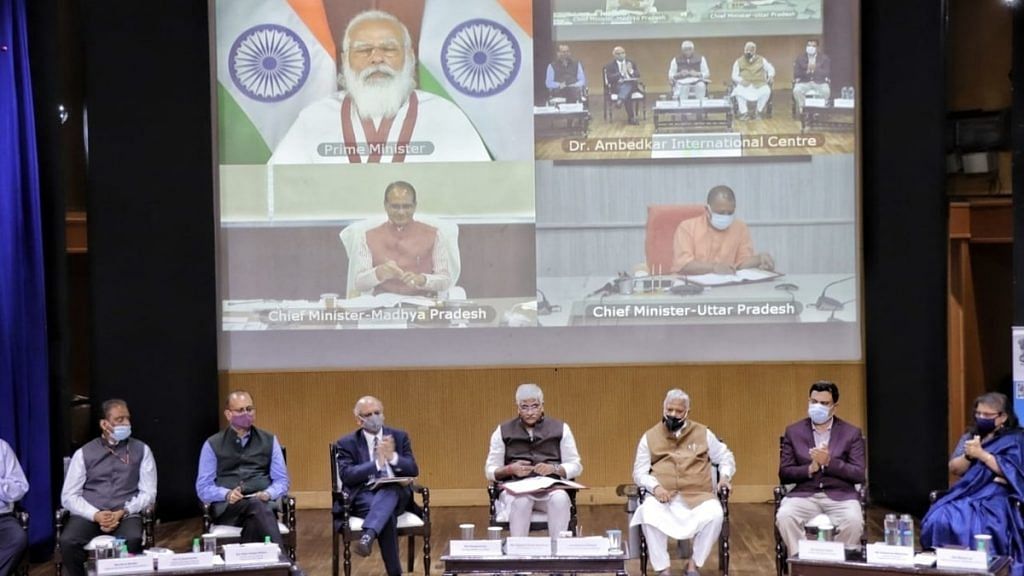New Delhi: About four decades after conceptualisation, India’s first river interlinking project, connecting Ken river in Madhya Pradesh with Betwa in Uttar Pradesh, is finally set to get off the drawing board.
On Monday, Union Jal Shakti Minister Gajendra Singh Shekhawat signed a tripartite agreement for the project implementation with Madhya Pradesh Chief Minister Shivraj Singh Chouhan and Uttar Pradesh Chief Minister Yogi Adityanath. Prime Minister Narendra Modi was also present at the event virtually.
The Ministry of Jal Shakti will now get the Public Investment Board approval for implementing the project as a national project. Once deemed a national project, the Centre will foot 90 per cent of the cost while the remaining 10 per cent will be shared by the two states.
All formalities, including stage-II forest clearance for Daudhan reservoir, will be obtained before the ministry goes for cabinet approval, a senior ministry official who didn’t wish to be named told ThePrint.
After work starts, the Rs 37,611-crore project will take eight years to complete, the official added.
A special purpose vehicle — the Ken-Betwa Link Project Authority — will be set up that would have representatives from the two states for the implementation of the project, which comprises two phases. The first phase involves building a 77-metre high dam across Ken near Daudhan village in MP.
Also read: Chhattisgarh CM rejects Naxalites’ terms for peace talks, says they ‘can’t impose conditions’
Long gestating period
Conceptualised in the 1980s, the ambitious river linking project failed to get off the drawing board, primarily because of differences between the two states over water sharing during non-monsoon season, funding issues and regulatory clearances.
Work on the project was originally slated to start in 2015.
The project got a fresh push last year, with the Narendra Modi government making a revised deal with the two states, specifying the quantum of water to be shared by them.
The project has also seen stiff opposition from environmentalists and opposition leaders.
Before the agreement was signed Monday, Congress MP and a former environment minister Jairam Ramesh tweeted, “The CMs of UP and MP will sign a pact today to link the Ken and Betwa rivers. This will all but destroy the Panna Tiger Reserve in MP, a success story in translocation and revival. I had suggested alternatives 10 years ago but alas.”
The CMs of UP and MP will sign a pact today to link the Ken and Betwa rivers. This will all but destroy the Panna Tiger Reserve in MP, a success story in translocation and revival. I had suggested alternatives 10 years ago but alas…
— Jairam Ramesh (@Jairam_Ramesh) March 22, 2021
How much water will MP and UP get?
According to the new Memorandum of Agreement signed Monday, of the over 6,590 mcm (million cubic metres) annual yield in Ken basin up to Daudhan dam, Madhya Pradesh shall utilise a total of 2,350 mcm while Uttar Pradesh shall get 1,700 mcm.
During the lean season (November to May), the water released to MP and UP from the storage in Daudhan reservoir shall be 1,834 mcm and 750 mcm, respectively.
A second senior Jal Shakti ministry official said the revised agreement was drafted taking into account the various concerns raised by both the states during a series of deliberations that have been going on since 2018.
The project wi.ll provide enormous benefits to the water-starved Bundelkhand region in MP and UP.
There are ten districts in the Bundelkhand region. While Panna, Tikamgarh, Chhatarpur, Sagar, Damoh and Datia fall in Madhya Pradesh, Banda, Mahoba, Jhansi and Lalitpur are in Uttar Pradesh.
Besides, the project is also going to help Vidisha, Shivpuri and Raisen districts of MP.
Once complete, the project will provide an annual irrigation to 10.62 lakh hectares of land — 8.11 hectare in MP and 2.51 hectare in UP. It will provide drinking water supply to a population of 62 lakh in the two states.
(Edited by Amit Upadhyaya)
Also read: ‘Central scheme under new name’ — Modi govt bars Kejriwal from rolling out rations delivery
